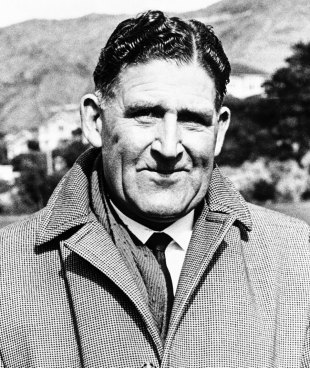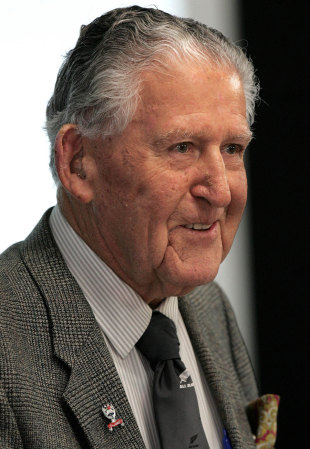|
Sir Fred Allen, 1920-2012
The blueprint for success
Huw Turner
April 29, 2012

Tributes have poured in for Sir Fred Allen who died on Saturday
© PA Photos
Enlarge
On a Saturday afternoon when the news in New Zealand might have been dominated by the latest political financial scandal or the senseless murder of a Wellington bus driver, the main TV channels led with the news of the death of a 92-year-old man who last coached the All Blacks in 1968. Fred Allen, knighted in 2010, was not just another All Blacks coach, however, and the depth and extent of the respect in which he was held was reflected in the choice of individuals invited to reflect on his life and assess his contribution to New Zealand rugby. Brian Lochore and Colin Meads, both knighted themselves in recent times, were giants of the game in the 60s and early 70s and true legends of All Blacks rugby. Both contributed mightily to the legacy of invincible All Black forward power and both captained their country. Lochore notably on the 1967 tour of the United Kingdom; Meads during the Lions' triumphant 1971 tour. To hear these men talk of the manner in which Allen intimidated them as players and instilled in them the fierce will to win associated with the All Blacks gave a very clear insight into his strength as an individual and as a coach. A former All Blacks captain, Allen went on to coach the side from 1966-68 and led them to victory in all 14 Tests played during that period. This makes him the only unbeaten All Blacks coach. In the professional era, with burgeoning fixture lists and annual Tests between northern and southern hemisphere national sides, such statistics can appear quaint and do need to be placed in context. The 1967 All Blacks side that toured the United Kingdom and Ireland has come to be regarded as a truly great side, for its record, its style of play and for the individuals who played in the team. I witnessed this side play and beat Wales at the Arms Park on November 11, 1967 and I can testify to the power and greatness of those All Blacks. The 1967 All Blacks were the sixth side to tour the United Kingdom, bearing in mind that tours in those days were protracted affairs which took the tourists to every provincial corner of the country. Allen and his tour manager Charles Saxton were both soldiers who saw action in the Second World War. They were both members of the 1945-46 New Zealand Army 'Kiwis' side which beat Wales by 11 points to 3 at the Arms Park. This avenged the 1905 and 1935 defeats at the hands of Wales but unfortunately for Allen and Saxton the match was not recognised as a full international.
The Saturday prior to the Welsh game the All Blacks defeated England at Twickenham and in his programme notes for the Cardiff clash the doyen of Welsh rugby writers, J.B.G.Thomas, wrote, "Saxton promised good football - He kept his promise at Twickenham". He went on,"…the value of coaching cannot be denied, because the secret of the All Blacks' success down through the years is discipline, dedication, fitness and coaching. The rugby countries of the northern hemisphere have a great deal of leeway to make up before the general high standards of New Zealand play can be achieved, but coaching is the quickest, if not the easiest, road to success." Allen will always be remembered for developing new levels of fitness in his All Blacks side with innovation and thoroughness in the way his squad prepared and trained. Intensity has become one of those rugby buzzwords, but Allen's All Blacks were never less than intense in everything they did. This did not necessarily make them loved but they were feared and respected. How strange it now seems that coaching was such anathema to so many in the north in those long ago amateur days and that anybody thought it possible to beat the might of the All Blacks with such poor preparation. It would have been funny if it had not been so sad.

Allen coached the All Blacks on a 14-Test unbeaten run between 1966 and 1968
© Getty Images
Enlarge
In 1967, Allen's All Blacks played the Welsh in atrocious Cardiff conditions, one of those mudbaths for which it was notorious. I remember squeezing into the East Terrace about 15 minutes before kick-off, if attitudes to coaching in the north were primitive so were attitudes to crowd safety. The All Blacks fielded Earl Kirton and Chris Laidlaw at half back, the former now a Wellington dentist, the latter a celebrated diplomat and broadcaster. They also boasted a formidable pack of forwards, in the days before substitutions had been dreamt up - Gray, McLeod and Muller in the front row, Strahan and Meads in the second and Lochore, Tremain and Williams in the back-row. Left winger Birtwhistle and centre Davis scored the game's only two tries in a 13-6 victory for the All Blacks, the other points coming from fullback Fergie McCormick. For Wales, Barry John and Gareth Edwards were making just their third appearance and ESPNscrum columnist John Taylor was making his fifth. In an attempt to beef up the forwards, Neath hard man Brian Thomas was moved from the second row into the front and the side was captained by hooker Norman Gale. One of the match's curiosities was that in a side containing Barry John, who did drop a goal, Wales' other points were scored by skipper Gale kicking a penalty. Affectionately known as 'The Needle', as much a reference to his profession as a tailor as his spiky coaching style, Allen will be remembered foremost as a coach, a successful coach, in the days before coaches really existed. Except down here. © ESPN Sports Media Ltd.
| |||||||||||||||
Live Sports
Communication error please reload the page.
-
Football
-
Cricket
-
Rugby
-
- Days
- Hrs
- Mins
- Secs
F1 - Abu Dhabi GP
Abu Dhabi Grand Prix December 11-131. Max Verstappen ()
2. Valtteri Bottas (Mercedes)
3. Lewis Hamilton (Mercedes)
4. Alexander Albon ()
5. Lando Norris ()
6. Carlos Sainz Jr ()
-
ESPNOtherLive >>
Darts - Premier League
Golf - Houston Open
Snooker - China Open
Tennis - Miami Open

